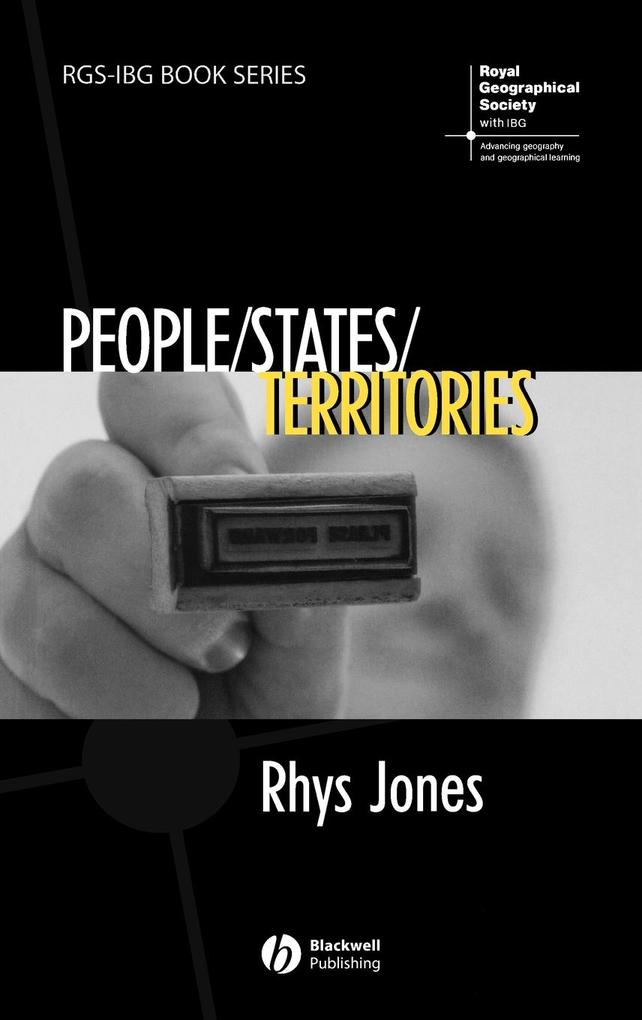
Zustellung: Di, 01.07. - Sa, 05.07.
Versand in 2 Wochen
VersandkostenfreiBestellen & in Filiale abholen:
People/States/Territories examines the role of state personnel in shaping, and being shaped by, state organizations and territories. The text develops a conceptual understanding of the state as a continually emerging and contingent territorial organization, which is reproduced, transformed, and contested by state personnel. Rhys Jones demonstrates how the iterative practices of state actors may give meaning and permanence to - or, alternatively, may question and transform - the state apparatus. In addition, Jones highlights how the state's territory is continuously negotiated and translated by those individuals working within this state apparatus, and he illustrates how the identities and practices of state personnel have been influenced by the organizational and territorial networks of power that characterize the state. People/States/Territories views the state, along with the process of state transformation, as the product of a continual - yet temporally specific - interplay between state personnel, state organizations, and state territories.
Featuring accessible, relevant case studies of four key periods in the transformation of the state within Britain, this book focuses specifically on: the medieval process of state formation in Wessex, north-west Scotland, and north Wales; the consolidation of state organizations that took place in England and Wales during the early modern period; the peopling of a state- and territorially-organized process of government inspection in the nineteenth century in the north of England; and the territorial, organizational and peopled contexts for the current process of devolution being experienced in the UK.
Featuring accessible, relevant case studies of four key periods in the transformation of the state within Britain, this book focuses specifically on: the medieval process of state formation in Wessex, north-west Scotland, and north Wales; the consolidation of state organizations that took place in England and Wales during the early modern period; the peopling of a state- and territorially-organized process of government inspection in the nineteenth century in the north of England; and the territorial, organizational and peopled contexts for the current process of devolution being experienced in the UK.
Inhaltsverzeichnis
Series Editors' Preface. Acknowledgements.
1. Introduction: state personnel and the reproduction of state forms.
2. Analysing an emergent state: state actors and a territorial state apparatus.
Thinking about the state. . . .
Medieval and early modern political theory: conceptualising political authority.
Weber and the bureaucratic machine of the modern state.
The human geographies of strategic-relational state theory.
Exploring the networked state.
Bringing it all together: analysing an emergent state.
3. Peopling the medieval state.
A case of stating the obvious? .
People and the feudal state.
State leaders and the emergence of medieval state forms in the British Isles.
Local government and the validation and contestation of state forms.
The medieval state: different not worse? .
4. Embodying early modern state consolidation.
Peopling the central state apparatus.
The body politic: JPs and the political constitution of England and Wales.
Shaping and steering the local state.
State personnel and the embodiment of early modern state consolidation.
5. The state of high modernity: the age of the inspector.
The nineteenth-century revolution in government.
The age of the inspector.
Leonard Horner and the regulation of factory production.
Embodying a tentative state consolidation.
6. Breaking-up: people and the late modern UK state.
The challenges of executive devolution in the UK.
New devolved organizations, new organizational cultures.
State personnel and the 'joining up' of regional governance.
Territorial identities and the reproduction of devolution.
Devolution in prospect.
7. Conclusions: peopling the state.
Bibliography.
Index
1. Introduction: state personnel and the reproduction of state forms.
2. Analysing an emergent state: state actors and a territorial state apparatus.
Thinking about the state. . . .
Medieval and early modern political theory: conceptualising political authority.
Weber and the bureaucratic machine of the modern state.
The human geographies of strategic-relational state theory.
Exploring the networked state.
Bringing it all together: analysing an emergent state.
3. Peopling the medieval state.
A case of stating the obvious? .
People and the feudal state.
State leaders and the emergence of medieval state forms in the British Isles.
Local government and the validation and contestation of state forms.
The medieval state: different not worse? .
4. Embodying early modern state consolidation.
Peopling the central state apparatus.
The body politic: JPs and the political constitution of England and Wales.
Shaping and steering the local state.
State personnel and the embodiment of early modern state consolidation.
5. The state of high modernity: the age of the inspector.
The nineteenth-century revolution in government.
The age of the inspector.
Leonard Horner and the regulation of factory production.
Embodying a tentative state consolidation.
6. Breaking-up: people and the late modern UK state.
The challenges of executive devolution in the UK.
New devolved organizations, new organizational cultures.
State personnel and the 'joining up' of regional governance.
Territorial identities and the reproduction of devolution.
Devolution in prospect.
7. Conclusions: peopling the state.
Bibliography.
Index
Produktdetails
Erscheinungsdatum
18. Juni 2007
Sprache
englisch
Seitenanzahl
232
Autor/Autorin
Rhys Jones
Verlag/Hersteller
Produktart
gebunden
Gewicht
519 g
Größe (L/B/H)
240/161/17 mm
ISBN
9781405140331
Entdecken Sie mehr
Pressestimmen
"Peoples/States/Territories is an extremely important book. It provides a compelling historical analysis of the British state and will be of interest to geographers, political scientists, historians and sociologists. It is the best account we have on the territorial foundations of British political authority and demonstrates the enormous potential of integrating techniques and ideas from both historical and political geography." Mike Heffernan, University of Nottingham "This is an original and well written book that will add significantly to arguments about state formation in the UK. It brings a valuable historical perspective to the debate and turns an overdue spotlight on the role of people in the shaping of state institutions." Joe Painter, Durham University
Bewertungen
0 Bewertungen
Es wurden noch keine Bewertungen abgegeben. Schreiben Sie die erste Bewertung zu "People - States - Territories" und helfen Sie damit anderen bei der Kaufentscheidung.








